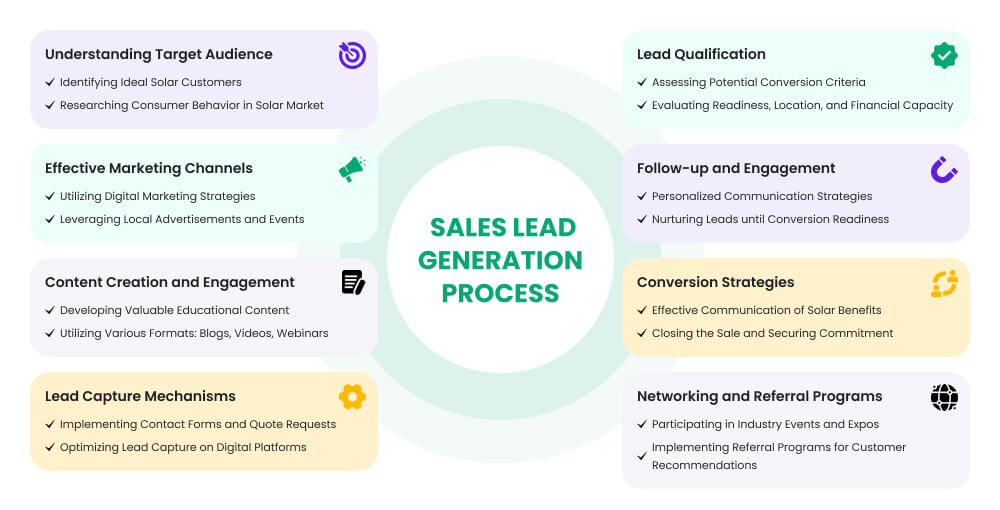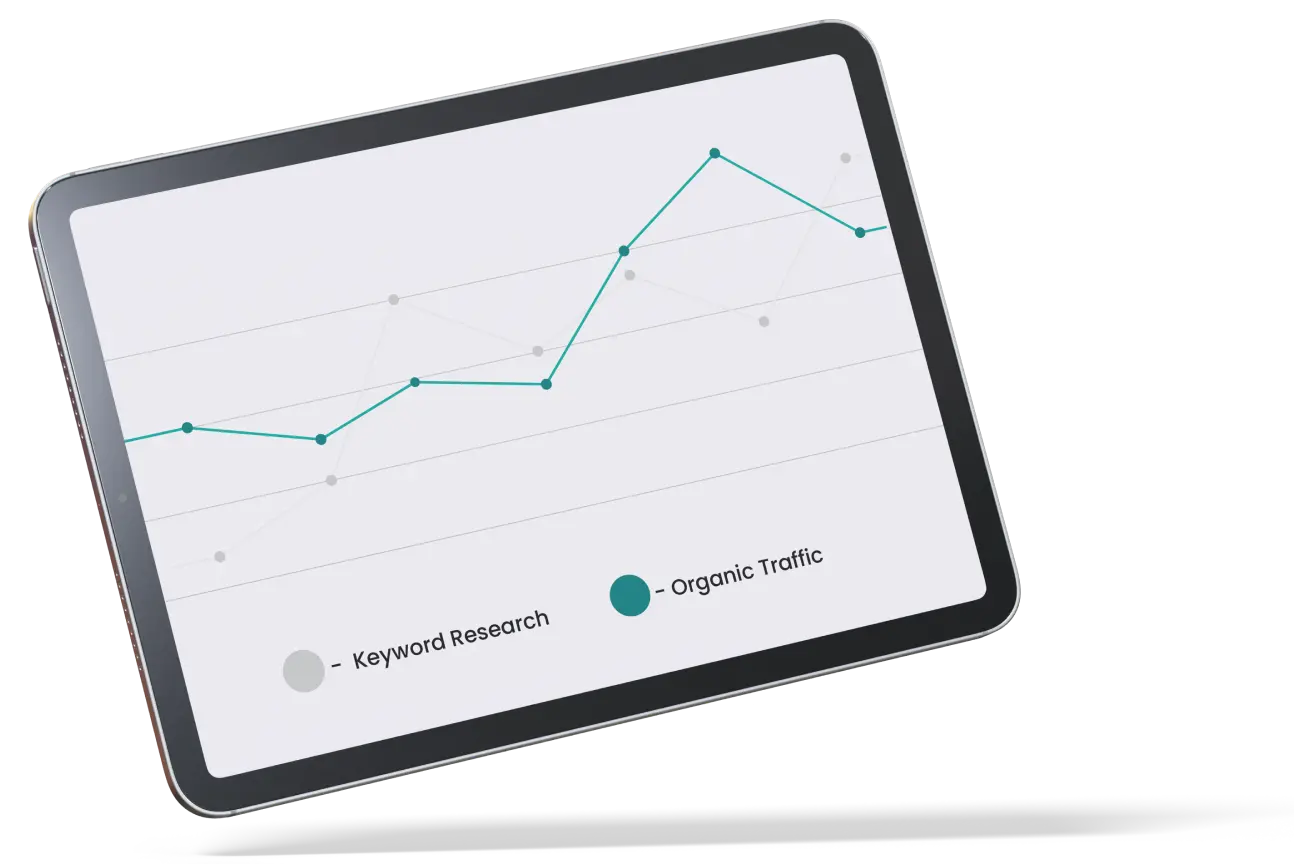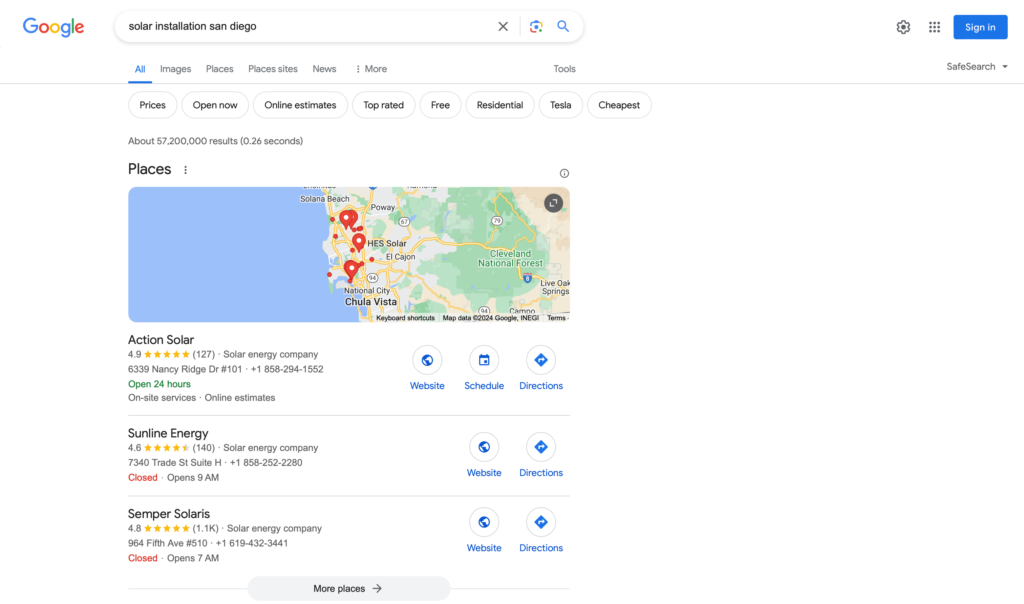How to Generate High-Quality Solar Leads

- Overview of Solar Lead Generation Process
- Insight Into Your Target Audience
- Create Attractive Solar Offers
- Optimize Your Solar Website for Lead Generation
- Content Marketing Strategies
- Start Ranking Higher Today with our SEO company
- Search Engine Optimization (SEO)
- Paid Advertising Strategies for Solar Leads
- Networking and Referral Programs
- Lead Tracking and Management
- Case Studies and Success Stories
- Final Thoughts on Generating Solar Leads
Your request has been successfully sent!
Generating high-quality solar leads is crucial for the success and growth of businesses in the solar industry. As renewable energy becomes increasingly popular, the market for solar solutions expands, making the ability to attract and convert potential customers more competitive and vital. Effective solar panel lead generation strategies ensure that your business stands out and reaches interested buyers, ultimately contributing to a healthier bottom line and a more sustainable world.
Overview of Solar Lead Generation Process

If you want to know how to generate solar leads, you should know that the process involves several key steps designed to attract, engage, and convert potential customers into actual clients. Here’s a general framework to understand how to get solar leads:
1. Market Research
Understanding your target audience—including their needs, preferences, and behaviors—is fundamental when you start thinking about how to generate leads for solar sales. This involves analyzing geographical locations with high solar potential, typical customer profiles, and competitors.
2. Marketing and Outreach
For solar leads generation, utilize various marketing channels to reach potential customers. This can include digital marketing (such as SEO, PPC advertising, and social media campaigns), local advertisements, community events, and partnerships with other businesses.
3. Educational Content
Offering valuable content that educates your audience about the benefits and processes of installing solar panels helps build brand authority and trust. Content can be in the form of blogs, videos, webinars, and informational brochures.
4. Lead Capture
Implement mechanisms on your digital platforms for potential solar installation leads to express interest. This could be through sign-up forms, quote requests, and contact forms.
5. Lead Qualification
Use criteria to assess which leads have the genuine potential to be converted into a solar sales lead generation process. This might involve assessing their readiness to invest in solar technology, location, or financial capacity.
6. Follow-up and Engagement
Engage qualified solar energy leads with personalized follow-up communications to nurture their interest until they are ready to make a purchase. This can include emails, phone calls, or in-person consultations.
7. Conversion and Sales
The final step is converting these leads into customers by effectively communicating the value and feasibility of solar installations tailored to their specific needs.
Each step in this process is interconnected and critical for building a robust pipeline of interested customers who are likely to invest in solar solutions. By focusing on these areas, a solar business can optimize solar lead generation efforts and achieve better results. Do not hesitate to get solar leads.
Insight Into Your Target Audience
Identify Your Ideal Solar Customer
Before buying solar leads, identify your ideal solar customer. It is critical to tailoring your marketing efforts and product offerings, and calculating the solar leads cost. Factors that define an ideal customer include:
- Age: Typically, homeowners between the ages of 30 and 65 are prime candidates for solar installations, as they are likely to own their homes and invest in long-term improvements.
- Income Level: Higher income levels generally indicate a greater ability to afford the initial investment of solar panels.
- Geographic Location: Areas with higher sunlight exposure and higher local electricity rates are more conducive to solar investments. Additionally, states with favorable solar incentives and rebates are attractive markets.
- Energy Consumption Habits: Households with higher energy consumption may seek solar power to reduce their electricity bills and dependence on the grid.
Research on Consumer Behavior in the Solar Market
According to SEIA solar industry research data, understanding consumer behavior is key to targeting and engaging potential solar power customers. Here are some essential insights:
Decision-Making Patterns:
- Awareness and Education: Consumers learn about solar power benefits and costs.
- Consideration: They compare solar providers, technologies, and financing options, seeking reviews and testimonials.
- Decision: Choices are influenced by price, value, brand trust, and customer service availability.
Motivations:
- Financial Savings: Lowering monthly electricity costs and hedging against rate hikes.
- Environmental Impact: Reducing carbon footprints and supporting sustainability.
- Energy Independence: Minimizing reliance on traditional power grids.
Preferences:
- Technology: Choices are shaped by specific solar technologies and advancements.
- Installation and Service: A smooth installation process and reliable service are prized.
- Financing Options: Accessible financing options like leases, loans, and PPAs affect decisions, along with the fairness of these arrangements.
Segmentation of Your Audience for Targeted Marketing
Segmentation allows for more personalized and effective marketing approaches to buying solar leads by dividing your audience into groups based on shared characteristics or behaviors.
- Demographic Segmentation: Dividing your audience by age, income, or family size to tailor messaging and offers.
- Geographic Segmentation: Targeting specific regions or localities, especially those with high solar potential or favorable solar policies.
- Behavioral Segmentation: Focusing on consumers’ purchasing behaviors, such as those who are actively searching for green energy solutions or those who have recently moved into a new home.
- Psychographic Segmentation: Considering lifestyle and values, such as environmental activism or tech-savviness, which can influence the decision to adopt solar technology.
Create Attractive Solar Offers
Types of Offers to Generate Solar Leads
Creating attractive offers is a key strategy to generate solar leads. These offers not only engage potential customers but also provide them with valuable information and incentives to choose solar energy. Here are several effective types of offers that can be integrated into your solar consultation process:
Free Solar Consultation
Offering a no-cost consultation is an excellent way to attract potential customers. During the consultation, customers can learn about the benefits of solar energy and the installation process, and get answers to any questions they may have, establishing trust and opening the door for further engagement.
Solar Assessment or Evaluation
This offer involves a detailed assessment of a customer’s property to evaluate its suitability for panels. It includes an analysis of roof space, orientation, and shading, providing customers with a customized proposal on how solar can meet their energy needs.
Solar Savings Calculator
Providing potential customers with access to an online tool that calculates potential savings from switching to solar can be a powerful motivator. This interactive approach helps customers visualize the financial benefits over time in the solar industry.
Energy Efficiency Audits
Offering an energy efficiency audit as part of the solar installation process can add significant value. This audit can identify other energy-saving opportunities within a home or business, helping customers optimize their overall energy usage and enhance the cost-effectiveness of going solar.
Make Effective Calls to Action (CTAs)
Effective calls to action (CTAs) are vital for engaging solar industry customers. Key CTAs include:
- “Schedule Your Free Solar Consultation Today!”: Encourages immediate action.
- “Find Out How Much You Can Save”: Highlights financial benefits, linked to the Solar Savings Calculator.
- “Get Your Custom Solar Report”: Offers personalized info via solar assessments.
- “Optimize Your Home’s Efficiency”: Focuses on energy efficiency benefits.
Ensure these CTAs are prominently displayed on your website, social media, and marketing materials, using urgent language and limited-time offers for potential customers to enhance effectiveness and lead generation for solar companies.
Optimize Your Solar Website for Lead Generation

Creating a website that effectively serves as a solar lead generator is crucial for solar companies looking to capitalize on online traffic and convert visitors into potential customers. The design and functionality of your website should be tailored to not just inform visitors but also engage them and guide them toward becoming valuable leads for solar companies.
Design a Lead-Centric Website
Creating a website focused on solar lead generation means designing every element to engage visitors and encourage them to become your own leads. A user-friendly design is essential, ensuring that your site is easy to navigate with a clear, intuitive layout. This allows visitors to find information quickly and effortlessly. For buying solar leads, your website must also be optimized for mobile devices, as a significant portion of users access websites via smartphones and tablets.
Forms and Lead Capture Techniques
Effective lead capture on a solar website can be enhanced by using various forms and techniques to engage users and collect their information. Prominently place contact forms on the homepage, contact page, and other strategic areas, requesting only essential details like name, email, and phone number to keep it simple.
Content Marketing Strategies
Content marketing is a vital tool for solar energy companies aiming to educate potential buyers and generate quality leads. By producing and disseminating valuable content, solar businesses can establish themselves as authoritative voices in the industry while addressing the common queries and concerns of their target audience.
Create Informational Content for Solar Buyers
Developing informational content is a cornerstone of effective content marketing for solar energy companies. The content should educate potential buyers about the benefits and intricacies of solar energy solutions, guiding them through the decision-making process.
This could include detailed blog posts, infographics, and videos that cover topics such as the cost benefits of solar energy, the installation process, maintenance tips, and the environmental impact of switching to solar.
Distribute Content to Attract Solar Leads
To attract residential solar leads, effectively distribute your high-quality content across multiple channels. Utilize social media platforms like Facebook, Twitter, and LinkedIn for engagement and sharing, and send email newsletters to interested subscribers. Also, optimize your content for search engines to target those searching for solar solutions. For lead generation, solar companies should consider partnerships with influencers or businesses in the energy sector to broaden their reach. Strategic distribution enhances visibility and improves your chances of generating solar leads.
Start Ranking Higher Today
with our SEO company
Drive more qualified leads to your solar company’s website with our proven Solar SEO techniques. Take the first step towards solar success now!

Search Engine Optimization (SEO)
Effective search engine optimization (SEO) is crucial for solar companies aiming to increase their visibility online and attract more residential and commercial solar leads. By optimizing your website and content for search engines, you can improve your rankings in search results, making it easier for future customers to find your services when they search for solar solutions.
Keyword Research and Optimization Tactics
Successful SEO starts with thorough keyword research. This process involves identifying the terms and phrases possible customers are using to search for solar-related services. Tools like Google Keyword Planner or Ahrefs can help you discover relevant keywords such as “solar panel installation, “solar installers”, “solar energy benefits,” or “residential solar panel cost.”
Local SEO Strategies for the Solar Industry
For solar companies and solar installers, local SEO is essential. Customers often prefer local providers for cost savings and convenience. To optimize, ensure your solar business is listed in local directories and Google My Business. Use location-specific keywords on your website, like “solar installation San Diego”. Encourage positive reviews to boost credibility. Local backlinks from reputable sites enhance local search rankings. Engage with local communities and events to increase visibility and obtain valuable backlinks, and as a result, start purchasing solar leads.

Paid Advertising Strategies for Solar Leads
Paid advertising is a powerful tool for solar companies to quickly increase visibility and generate quality leads. It leverages targeted campaigns on platforms like Google Ads and social media to reach customers who are actively searching for or interested in solar solutions.
Google Ads and PPC Campaigns for Solar Leads
Google Ads, particularly pay-per-click (PPC) campaigns, are effective for reaching users searching for solar-related keywords. Successful PPC campaigns involve:
- Keyword Research: Identifying high-intent keywords related to solar services.
- Ad Copy: Crafting compelling ad copy that highlights the benefits of your solar solutions.
- Landing Pages: Directing users to optimized landing pages that provide relevant information and a strong call to action.
- Tracking and Analytics: Using tools like Google Analytics to monitor ad performance and optimize accordingly.
Social Advertising Techniques for Lead Generation
Social media platforms provide excellent opportunities for targeted advertising. Effective strategies include:
- Audience Targeting: Using demographic and interest-based targeting to reach potential quality leads, such as homeowners interested in sustainability.
- Engaging Content: Creating visually appealing ads with content that resonates with the target audience, like customer testimonials or educational videos.
- Calls to Action: Incorporating clear calls to action in ads to encourage user engagement and conversion.
- Retargeting: Implementing retargeting campaigns to capture the interest of users who visited your site but didn’t convert.
By implementing these paid advertising strategies, solar companies can effectively expand their reach and enhance solar lead generation, converting more online users into prospective customers.
Networking and Referral Programs
Participate in Industry Events and Expos
Participation in industry events and expos is a valuable and cost-effective way for solar companies to connect with future customers, partners, and industry leaders. These events provide a platform to showcase products, share expertise, and stay updated with industry trends.
Implement Referral Programs for Solar Customers
Referral programs incentivize existing customers to recommend your services to others. By offering rewards such as discounts, service upgrades, or one-time payments for each successful referral, companies can motivate satisfied customers to become brand ambassadors. Such programs not only increase customer loyalty but also leverage word of mouth for generating leads.
Host Educational Webinars for Solar Buyers
Hosting webinars is an excellent and cost-effective way to educate potential commercial solar leads about the benefits of solar energy. These online events can cover various topics, including the technical aspects, financial benefits, and environmental impact of solar installations. Webinars allow solar companies to demonstrate their expertise and engage with a broader audience in real time, fostering trust and encouraging participants to explore solar solutions further. As a result, they can start purchasing solar leads.

Lead Tracking and Management
Implement a Lead Management System
A lead management system organizes, tracks, and manages solar panel leads efficiently. Some of the top tools recommended include:
- HubSpot: Integrates marketing, sales, and service software with robust lead management capabilities.
- Salesforce: Offers extensive features for tracking customer engagement and performance metrics.
- Zoho CRM: Provides a user-friendly interface with effective lead management and workflow automation features.
These systems enhance the ability to follow up on your own leads quickly and personalize communications, leading to better conversion rates.
Lead Scoring and Qualification Criteria
Lead scoring assigns values to each lead based on their conversion potential, helping prioritize which leads to follow up with first. Factors might include the lead’s interaction with your website, geographic location, and specific interests in solar products.
Lead qualification criteria identify purchasing leads ready for sales conversations, focusing on their budget readiness, decision-making authority and need for solar solutions. Applying these lead generation methods allows solar companies to focus their efforts more effectively, boosting productivity and sales success.
Case Studies and Success Stories
Real-World Examples of Successful Solar Lead Generation
SolarCity’s Referral Program
SolarCity (now Tesla Energy) leveraged a referral program where existing customers were incentivized to refer new clients. Offering rewards like cash incentives, gift cards, or discounts on future installations, SolarCity transformed satisfied customers into active promoters, utilizing word of mouth to expand its customer base effectively.
Sunrun’s Community Outreach Events
Sunrun, a prominent residential solar provider, frequently organizes community outreach initiatives, including workshops, educational seminars, and neighborhood solar parties. These events allow Sunrun to engage directly with local residents, educate them about solar energy benefits, and gather high-quality leads through offers like free home assessments for solar suitability. By integrating themselves into the community and establishing trust, Sunrun effectively secures quality leads.
Lessons Learned from Top Solar Companies
From the successes of major players in the solar niche, several key lessons emerge that can guide other companies in enhancing their solar lead generation efforts:
- Customer Experience: Prioritize the customer journey from initial contact to post-installation support for satisfaction and referrals.
- Transparency and Communication: Maintain open communication about processes, costs, and expectations to build trust and reduce hesitance.
- Strong Branding and Marketing: Develop a recognizable brand and consistent marketing to retain interest and attract high-quality leads.
- Partnerships and Collaboration: Form strategic partnerships to extend reach and enhance credibility.
- Continuous Improvement: Regularly update practices based on market trends and feedback for relevance and competitiveness.

Final Thoughts on Generating Solar Leads
In conclusion, it’s crucial to apply the insights and lead generation methods learned from this article to your solar marketing efforts. By taking proactive steps and implementing effective strategies, you can generate leads successfully. With dedication and commitment to excellence when buying solar leads, there’s immense potential for achieving your business objectives in the solar niche. Stay optimistic and keep pushing forward with confidence in your abilities to make a significant impact with lead generation companies. Choose the best way to get solar leads.




